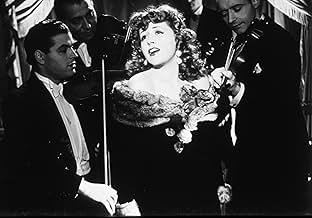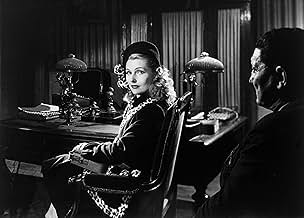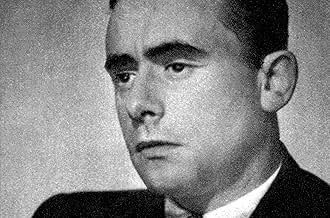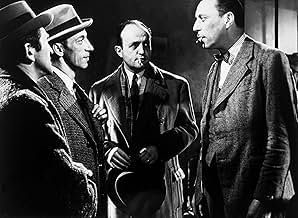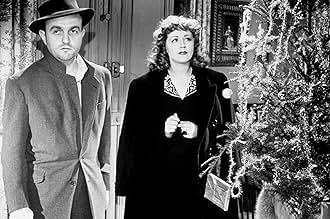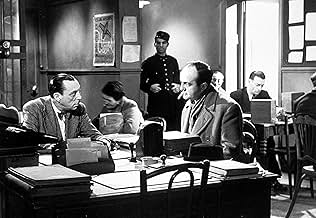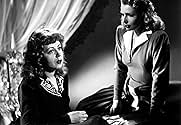AVALIAÇÃO DA IMDb
7,7/10
6,7 mil
SUA AVALIAÇÃO
Um marido ciumento pretende matar o homem que sua esposa está encontrando para negócios, mas chega e descobre que a ação já está feita.Um marido ciumento pretende matar o homem que sua esposa está encontrando para negócios, mas chega e descobre que a ação já está feita.Um marido ciumento pretende matar o homem que sua esposa está encontrando para negócios, mas chega e descobre que a ação já está feita.
- Direção
- Roteiristas
- Artistas
- Prêmios
- 2 vitórias e 1 indicação no total
Henri Arius
- Léopardi
- (as Arius)
Charles Blavette
- Le gendarme Poitevin
- (as Blavette)
René Blancard
- Le commissaire principal de la P.J.
- (as R. Blancard)
Robert Dalban
- Paulo
- (as R. Dalban)
Jean Daurand
- L'inspecteur Picard
- (as J. Daurand)
Jean Dunot
- Nitram
- (as J. Dunot)
Jacques Grétillat
- Auguste
- (as J. Grétillat)
Gilberte Géniat
- Mme Beauvoir
- (as G. Géniat)
Gabriel Gobin
- Le patron du bistrot
- (as G. Gobin)
François Joux
- L' officier de police Fayard
- (as F. Joux)
Avaliações em destaque
It takes a while for the scene to set, a subtle intriguing build up, just as you'd expect, but where is it going, this to-ing and fro-ing, as the alibis and excuses unwind and reset? To somewhere quite unexpected is the answer.
First of all,there is a detective story:"légitime défense" by Belgian Stanislas André Steeman whose "l'assassin habite au 21" Clouzot had already transferred to the screen in 1942,with Pierre Fresnay and the same actress Suzy Delair.Steeman complained about Clouzot's adaptation for both movies.The movie from 1942 was excellent,but the "detective story" side had been kept,so why complaining?As for "Quai des orfèvres",Clouzot was now in a new phase of his brilliant career.After having directed "le corbeau" and been blacklisted,he had a lot more to say than a simple whodunit.Steeman complained essentially about the poor detective ending,which I will not reveal of course,but Clouzot focused on the social vignettes,on his characters's psychology,and he did not give a damn about the puzzle à la Agatha Christie.By doing so,he becomes the genuine predecessor of CLaude Chabrol who has always been closer to him than to Alfred Hitchcock whom he admires much though. Suzy Delair has great screen presence,and you will love the song she really sings(she was a singer too)"avec son tralala".Bernard Blier gives ,as ever,a sparing of gestures and words performance,and he really pulls it off .Two characters are particularly interesting and disturbing:the first one,Dora,the photographer:she takes pictures of female models ,and Clouzot,by subtle touches,reveals us she's a lesbian.Of course,the word is never uttered(How could it be in 1947?) The police chief (fabulous Louis Jouvet) tells her:"You and me,WE are not lucky with women."The portrait of this cop is very detailed:we learn a lot of things about him,not necessarily connected with the Delair/Blier plot:he's a widower ,with a son he adores and who runs into school difficulties,particularly in geometry.So we get to know all the characters in depth.One of the most important manifesto of post-war French cinema.
Henri-Georges Clouzot's "Quai des Orfevres" (1947) stars Suzy Delair, Bernard Blier, Louis Jouvet, and Charles Dullin. The story takes place in post-war Paris, where an accompanist, Maurice Martineau (Blier) lives with his singer wife, Marguerite, better known as Jenny Lamour (Suzy Delair). An important man, Georges Brignon (Dullin) promises Jenny work, and because she's ambitious, she flirts with him. Maurice is an extremely jealous man, so he finds Brignon in a restaurant and threatens him.
Later on, Jenny tells Maurice she is visiting her grandmother, who lives in another town. This gives Maurice a good opportunity to bump off Brignon, especially when he finds the man's address on a piece of paper in the kitchen and realizes Jenny was lying. But when he gets to Brignon's house, Brignon is already dead.
Inspector Antoine (Juvet) is assigned to the case, and it doesn't take him long to realize that some alibis aren't very secure.
Wonderful film, with the excellent Juvet outstanding as Inspector Antoine, and an excellent performance by Simone Renant as a lesbian photographer, Dora, in love with Jenny. Delair, who was involved with Clouzot, is good as a lower-class woman who loves her husband but wants to get ahead in show business as well.
This is Clouzot at his best, with a witty script with some plot twists and a true Parisian atmosphere.
Later on, Jenny tells Maurice she is visiting her grandmother, who lives in another town. This gives Maurice a good opportunity to bump off Brignon, especially when he finds the man's address on a piece of paper in the kitchen and realizes Jenny was lying. But when he gets to Brignon's house, Brignon is already dead.
Inspector Antoine (Juvet) is assigned to the case, and it doesn't take him long to realize that some alibis aren't very secure.
Wonderful film, with the excellent Juvet outstanding as Inspector Antoine, and an excellent performance by Simone Renant as a lesbian photographer, Dora, in love with Jenny. Delair, who was involved with Clouzot, is good as a lower-class woman who loves her husband but wants to get ahead in show business as well.
This is Clouzot at his best, with a witty script with some plot twists and a true Parisian atmosphere.
In the postwar Paris, the accompanist pianist Maurice Martineau (Bernard Blier) is a jealous man from the upper class married with the ambitious singer Marguerite Chauffournier Martineau, most known by her artistic name Jenny Lamour (Suzy Delair), a woman with past from the lower classes. When the lecher but powerful Georges Brignon (Charles Dullin) harasses and invites Jenny for dinner promising a role in a film, Maurice goes to the restaurant and threatens Brignon. A couple of days later, Jenny tells Maurice that she is going to visit her grandmother in another town. However, her husband finds a piece of paper hidden in the kitchen with Brignon's address. Maurice goes to the theater to have an alibi and heads to Brignon's manor during the show with the intention of killing the old man. However, he finds Brignon's house open and the man dead on the floor. When he leaves the crime scene, his car is stolen and Maurice has to walk back to the theater. Meanwhile, Jenny arrives in the house of the lesbian photographer Dora Monier (Simone Renant), who is an old friend of Maurice and has a crush on Jenny, and tells Dora that she has just killed Brignon. But Jenny notes that she had forgotten her fur on the couch in the living room of Brignon's house and Dora takes a cab to retrieve the stole. Inspector Antoine (Louis Jouvet) is assigned to investigate the case and sooner he visits Jenny, Maurice and Dora to check their alibis for that night in the beginning of his investigation.
"Quai des Orfèvres" is an amusing story of an efficient detective investigating a murder in a comedy of errors of the three lead suspects. Henri-Georges Clouzot is one of the best French directors ever and "Quais des Orfèvres" is another gem in his filmography. The witty screenplay has many twists and is supported by the magnificent cinematography in black-and-white and awesome performances. Bernard Blier, the father of Bertrand Blier, is perfect in the role of a jealous cuckold without confidence in his wife and self-respect. Suzy Delair performs an ambitious woman that has a past with lovers and wants to climb positions in the show-business, but loves her husband. Simone Renant is great in the role of a lesbian photographer. But who steals the film is Louis Jouvet, in the role of a detective that seems to be naive, but is capable to find the truth that each character intends to hide. My understanding is that Antoine might be gay since he does not like women. My vote is eight.
Title (Brazil): "Crime em Paris" ("Crime in Paris")
"Quai des Orfèvres" is an amusing story of an efficient detective investigating a murder in a comedy of errors of the three lead suspects. Henri-Georges Clouzot is one of the best French directors ever and "Quais des Orfèvres" is another gem in his filmography. The witty screenplay has many twists and is supported by the magnificent cinematography in black-and-white and awesome performances. Bernard Blier, the father of Bertrand Blier, is perfect in the role of a jealous cuckold without confidence in his wife and self-respect. Suzy Delair performs an ambitious woman that has a past with lovers and wants to climb positions in the show-business, but loves her husband. Simone Renant is great in the role of a lesbian photographer. But who steals the film is Louis Jouvet, in the role of a detective that seems to be naive, but is capable to find the truth that each character intends to hide. My understanding is that Antoine might be gay since he does not like women. My vote is eight.
Title (Brazil): "Crime em Paris" ("Crime in Paris")
H.G. Cluozot had difficulties working in France after he had made "Le Corbeau" in 1943 which was produced by the German company and later judged by French as a piece of anti-French propaganda. Louis Jouvet, an admirer of Clouzot's work, invited him to direct a thriller "Quai des Orfevres" where he played an ambiguous police inspector investigating a murder that happened in Paris Music Hall. Without each other knowledge, the seductive cabaret singer Jenny Lamoure (Suzy Delair) and her jealous piano-accompanist husband Maurice who is madly in love with her (Bertrand Blier, father of director Bertrand Blier) trying to cover up (without each other's knowledge) what they believe to be their involvement in the murder? Enters tenacious policeman (Louis Jouvet) who is determined to discover the truth. Jouvet practically stole the movie with wonderfully cynic and sentimental in the same time performance. "His character, his eagle-like profile and his unique way of speaking made him unforgettable." "Quai des Orfevres", witty and atmospheric observation of human weaknesses was a great comeback of H.G. Cluozot, the fine director, "French Hitchcock".
Você sabia?
- CuriosidadesHenri-Georges Clouzot wrote almost two-thirds of the film only having read the novel years before, recalling it from memory, since it was out of print by the time he started the screenplay. When the novelist Stanislas-André Steeman saw the film, he was furious about the differences between the novel and the film.
- Erros de gravaçãoWhen Antoine is repeating Maurice's deposition to the typist, he says that the confrontation between Maurice and Brignon at the restaurant took place on Wednesday, December 2, 1946. In 1946, December 2 fell on a Monday.
- Citações
L'inspecteur adjoint Antoine: I have to admit, I've taken a liking to you, Miss Dora Monier.
Dora Monier: Me?
L'inspecteur adjoint Antoine: Because I have to say, you're just my type. When it comes to women, we'll never have a chance.
- ConexõesEdited into Histoire(s) du cinéma: La monnaie de l'absolu (1999)
Principais escolhas
Faça login para avaliar e ver a lista de recomendações personalizadas
- How long is Jenny Lamour?Fornecido pela Alexa
Detalhes
- Data de lançamento
- País de origem
- Central de atendimento oficial
- Idioma
- Também conhecido como
- Jenny Lamour
- Locações de filme
- Paris, França(Exterior)
- Empresa de produção
- Consulte mais créditos da empresa na IMDbPro
Bilheteria
- Faturamento bruto nos EUA e Canadá
- US$ 180.974
- Fim de semana de estreia nos EUA e Canadá
- US$ 9.632
- 27 de out. de 2002
- Faturamento bruto mundial
- US$ 181.041
- Tempo de duração1 hora 46 minutos
- Cor
- Proporção
- 1.37 : 1
Contribua para esta página
Sugerir uma alteração ou adicionar conteúdo ausente

Principal brecha
By what name was Crime em Paris (1947) officially released in Canada in English?
Responda
![Assistir a Bande-annonce [OV]](https://m.media-amazon.com/images/M/MV5BMmI1MGQ3ZWItMWI3Yi00M2RhLTkwMzEtODUyZWE5NmVhZGRlXkEyXkFqcGdeQXRyYW5zY29kZS13b3JrZmxvdw@@._V1_QL75_UX500_CR0)
